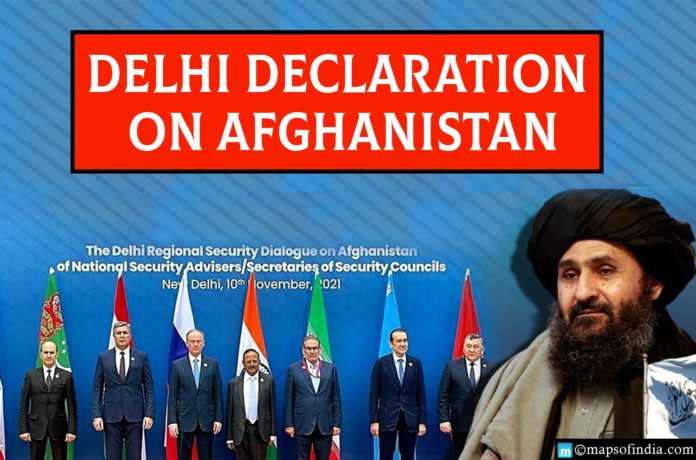On November 10, 2021, National Security Advisor Ajit Doval stated that the eight-nation regional security talk on Afghanistan would have significant repercussions for the Afghan people and its neighbouring and regions.
Ajit Doval is the head of India’s regional security talk, which was held in Delhi. The NSA’s representatives from five Central Asian nations, namely Kazakhstan, Kyrgyzstan, Tajikistan, Turkmenistan, Uzbekistan, and Russia and Iran, attended the meeting.
“It is a privilege for India to host this dialogue today. We have been keenly watching the developments in Afghanistan,” India Today quoted Doval as saying.
He added, “This is a time for close consultations amongst us, greater cooperation, and interaction and cooperation among the regional countries. I am confident that our deliberations will be productive, useful and will contribute to helping the people of Afghanistan. It will also enhance our collective security.”
On November 9, 2021, he conducted bilateral discussions with Tajikistan and Uzbekistan representatives. The talks centred on Afghanistan’s increasing threats of terrorism, the impending “humanitarian crisis,” and the importance of domestic acceptance of any Afghan government before international acceptance.
The summit in New Delhi was the first of its kind, intended to establish a uniform attitude and strategy on Afghanistan following the invasion of Kabul by the Pakistan-backed Taliban on August 15. Iran held the last two such summits in 2018 and 2019.
New Delhi did not contact the Taliban to the discussions since India doesn’t acknowledge the Taliban administration. Likewise, Pakistan and China, who had been invited, did not show up. While Pakistan declined the invitation, Islamabad’s close ally China declined due to schedule conflicts.
Afghanistan and its territory may not be used to hide or train terrorists or fund terrorist actions, according to a regional security meeting held by India and joined by eight countries on November 10, 2021.
As per the Delhi Declaration on Afghanistan, the eight contributing nations, accompanied by their respective national security advisers, addressed the escalating Afghan crisis, particularly the worldwide repercussions of the Taliban’s invasion in August.
The statement said all nations paid particular attention to the present political condition in Afghanistan, and barriers from terrorism, radicalization and drug smuggling were also highlighted.
The eight countries — India, Russia, Iran, Kazakhstan, Kyrgyzstan, Uzbekistan, Turkmenistan, and Tajikistan – also emphasized providing Afghanistan with all humanitarian aid available.
To guarantee that Afghanistan does not become a haven for global terrorism, all nations reiterated their unwavering commitment to combating terrorism in all of its forms and manifestations, including funding, destroying terrorist infrastructure, and preventing radicalization.
The Delhi Declaration expressed “deep concern” for the Afghan people and the worsening socio-economic status and humanitarian scenario, affirming the need for immediate assistance. It also stated that it was critical to forming an open and genuinely inclusive government that represents the will of all of the people of Afghanistan and has representation from all sections of their society.
In addition, the statement emphasized the importance of protecting the fundamental rights of women, children, and minority communities, especially in the context of current assaults on these people.




